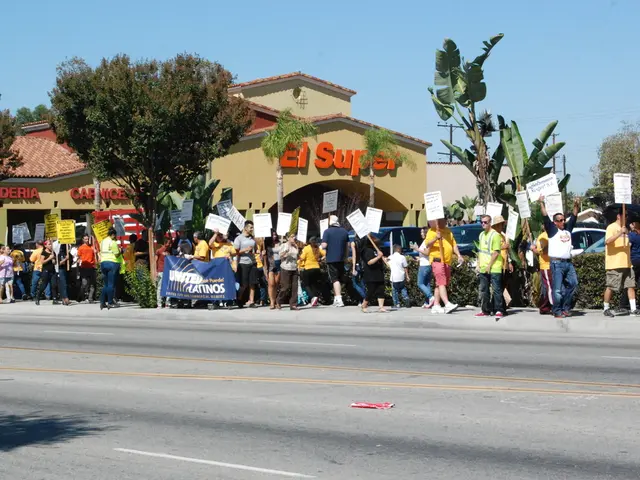Could the Winning Chances of 'Radical' Politicians Be Realized?
In the world of politics, the line between extremism and mainstream ideology can often blur. This is particularly evident in the electoral successes of candidates like Bernie Sanders and Donald Trump, two figures who have polarized the American electorate with their strong and uncompromising positions.
Phyllis Schlafly's 1964 book, A Choice Not An Echo, set the stage for this trend within the Republican Party. Schlafly argued that the Party should nominate a true conservative, a stance that has grown in power, culminating in the nomination of Ronald Reagan in 1980. Fast forward to the present, and we see a similar pattern emerging.
Extremist or highly polarized candidates tend to thrive in an environment of political polarization and fragmentation. In such a climate, voters often seek clear and uncompromising representation of their values, often at the expense of moderate or centrist alternatives. This was evident in the electoral successes of Sanders and Trump, who emerged as anti-establishment candidates with clear and strong ideological views.
For Sanders, his progressive socialism mobilized disaffected voters seeking radical change from the political status quo. Trump, on the other hand, appealed to those dissatisfied with mainstream politics with his nationalist-populism.
However, extremism comes with its drawbacks. It can intensify affective polarization, leading to voter hostility and decreased bipartisan cooperation. It raises risks of democratic erosion if extremism fuels mistrust in democratic institutions and fosters political violence.
The media and social media have also played a role in amplifying the reach of extremist candidates. The 2016 U.S. presidential election, involving Donald Trump, is a prime example of how extremist messaging on social media can affect voter behavior and amplify polarization.
Despite these risks, the electoral success of extremist or highly polarized candidates is a complex issue. Research shows that while they may mobilize committed voters, they can also deepen societal divisions and challenge democratic norms.
In the current debate, Sanders is perceived as the Democratic manifestation of the previously Republican line of thinking. Some observers, including former President Ford, thought that Reagan's nomination due to his ideological extremism would guarantee victory for the Democrats. However, history has proven otherwise.
Trump's ideological position is complex due to his past and current policy positions. Some classify him as an "extremist" based on his current support for restrictive immigration policies, while others find his ideology incoherent given his flip-flops on nearly every major issue.
The role of political elites in this dynamic is significant. Their beliefs about the electoral process matter, as they influence their decisions about which candidates to support. However, Trump's success this year shows that the elites aren't as strong as some believed. Many Republican elites don't believe that centrism is electorally beneficial, and the idea that the Republican Party wins when they nominate conservatives and loses when they nominate moderates has persisted among some Republican elites.
The debate continues as to whether Sanders would be Barry Goldwater or Ronald Reagan. If Trump loses, Republican elites might write him off as a RINO (Republican In Name Only) and attribute his loss to his past support of liberal policies.
In summary, ideological extremism can both enhance electoral success by mobilizing committed voters and simultaneously heighten polarization and societal risks. This dynamic underscores the interplay between ideological clarity, polarization, and democratic stability in general elections.
References:
[1] Levitsky, S., & Ziblatt, D. (2018). How Democracies Die. Crown.
[2] Abramowitz, M., & Saunders, D. (2018). The Great Alignment: Race, Party Transformation, and the Rise of Donald Trump. Oxford University Press.
[3] Allen, M. (2018). The Russian Connection: Spies, Cyber Attacks, and the Upcoming Election. Oxford University Press.
[4] Pildes, R. D., & Niemi, R. G. (2018). The End of the End of Ideology: On the Explanatory Power of Ideology in American Politics. Oxford University Press.








